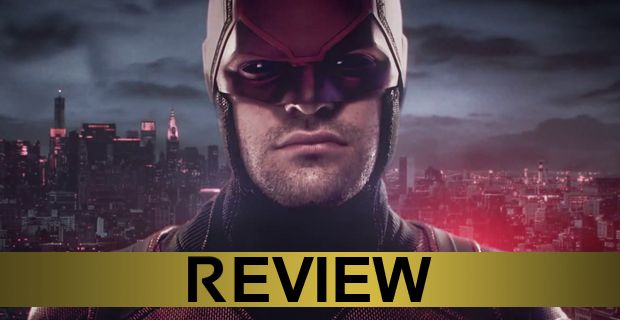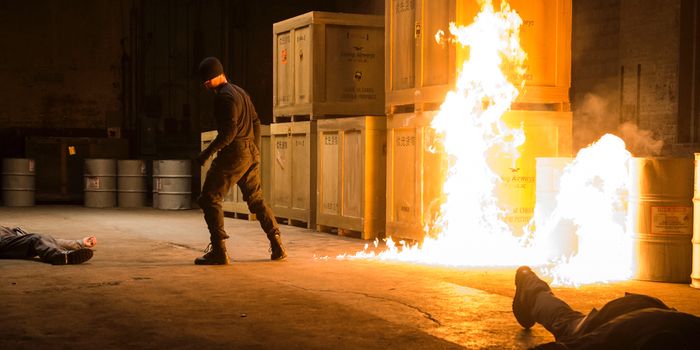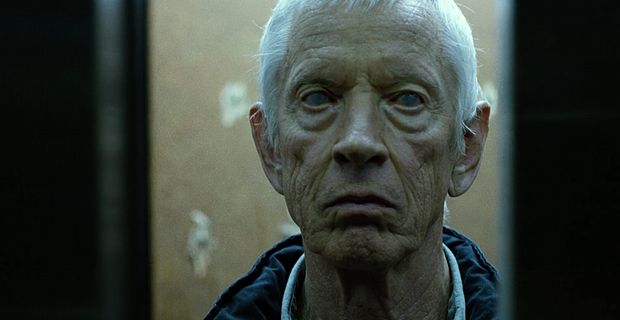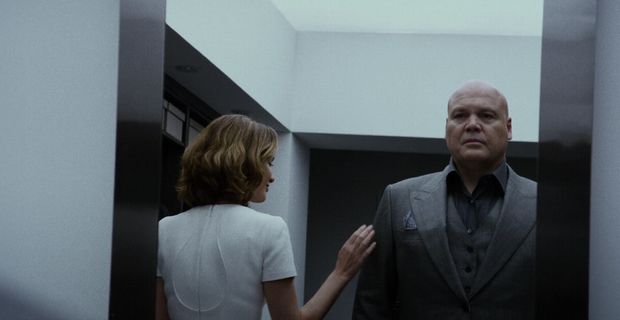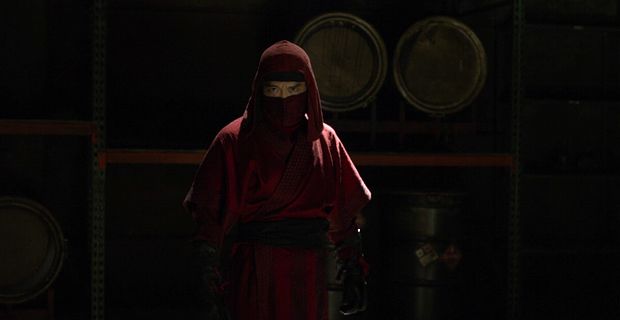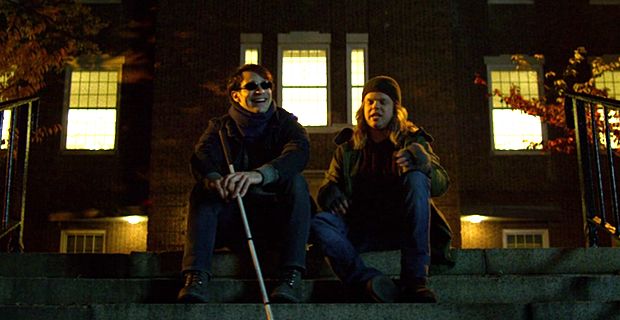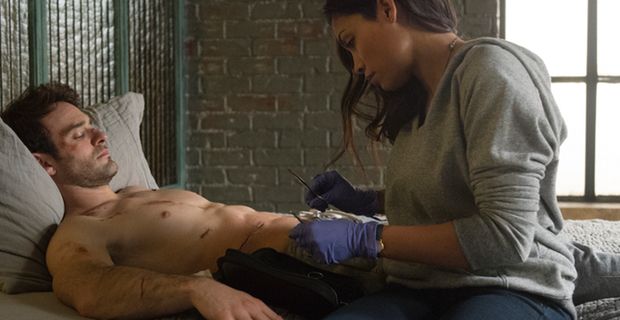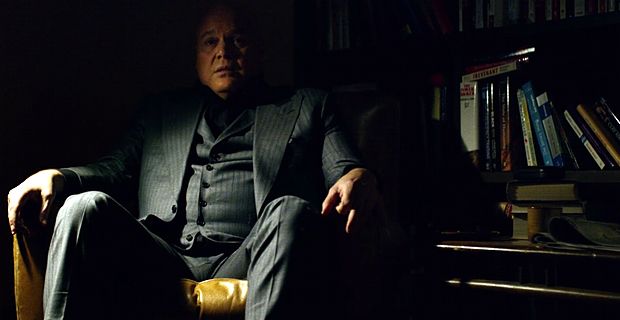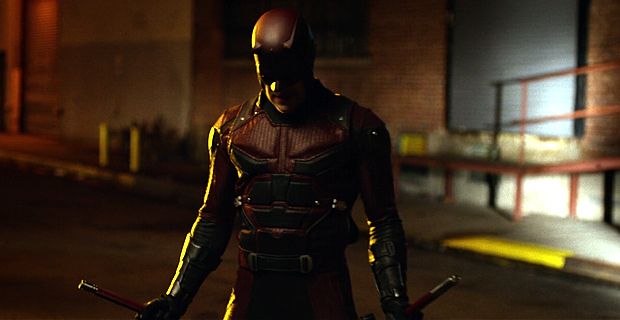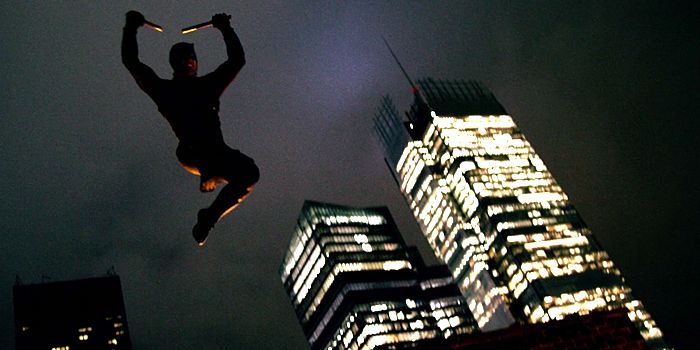[This is a review of Daredevil season 1, episodes 7-13. There will be SPOILERS.]
-
All 13 episodes of Daredevil have been available for long enough that it's time Screen Rant wraps up its discussion of season 1 with a look at the final episodes and the finale, which acts as a literal jumping off point for the character and the series as a whole.
The first six episodes delivered a compelling framework for the series to work within. It succeeded in establishing several key relationships, like Matt Murdock and his two friends, Foggy and Karen, as well as his complicated, semi-romantic relationship with Claire, and his even more complicated relationship with his faith – which is made possible through the excellent scenes between Charlie Cox and Peter McRobbie's Father Lantom. But it also spent plenty of time developing the series' other key relationship: the one between Vincent D'Onofrio's Wilson Fisk and his wickedly devoted and supportive girlfriend Vanessa Marianna.
Moreover, the series delivered a strong sense of place, by creating a Hell's Kitchen that felt inhabited by real people, who, in turn, made it feel like it was a place worth saving from the corruption of Fisk's corporation, and the "dream" he had for its future. But that sense of place, the level of specificity that went into creating a playground in which these characters could run around and do their thing is about more than giving the story somewhere to exist; it cements Daredevil in a palpable world, making it easier for the things that matter to the characters to also matter to the those watching at home.
And as the series ramped up to the inevitable showdown between Matt Murdock's alter ego and Wilson Fisk, it made some bold choices in revealing Matt's secret to Foggy. It also delivered a strange but satisfying digression that peeked into Murdock's past, which gave his thirst for justice (and love of punching people) some context in episode 7, 'Stick.'
-
Episode 7: 'Stick'
(The one where Scott Glenn gives Charlie Cox a run for his money)
Way back in 2012, while contemplating what a Daredevil television show might look like, I suggested that Scott Glenn would be terrific in the role of Stick. It's nice to be proven right from time to time. Glenn was last seen looking like the sinewy grandpa of everyone's nightmares in HBO's The Leftovers. During the episode dedicated to showing his character's impact on the life of a young and adult Matt Murdock, Glenn brings the same kind of "get off my damn lawn" intensity to his role, and even throws in some swordplay and martial arts to really send the message that this is one senior citizen not to be trifled with.
'Stick' is one of the aforementioned digression episodes, which makes the appearance of Glenn all the more important, as he helps make the uneven plotting and pacing feel anchored in something vital. The episode spends much of its time darting back and forth between flashbacks to Matt's youth, and the present day, where the reemergence of Stick does not exactly make Matt giddy.
Skylar Gaertner does a fine job as a young Matt, but his scenes mostly consist of a great moment when he and Stick sit on a park bench, eating ice cream and describing everything around them. The scene carries a lot of weight, and it builds a bond between the two that also underlines Matt's pending disappointment rather well. The only problem is the scene in which Stick exits Matt's life for 20 years feels too rushed, and while Gaertner is mostly convincing with his flying spin kicks in the basement, it borders on 3 Ninjas-level cutesiness.
It also doesn't help that Stick's mission in the U.S. is opaque at best, hinting at bigger things to come without helping the audience understand why it's important. The issue is worsened when Stick claims to have killed his target (a young boy) off screen, while Matt was busy fighting Japanese gangsters at the docks.
But the episode makes up for most of its shortcomings with a rousing surrogate father-son brawl in Matt's apartment (the damage of which is never fully cleaned up for the remainder of the season). It's strange to think that, in an episode dealing with so many issues about fathers and sons and finding strength in disability, Daredevil would manage to make a violent tussle seem to the most poignant aspect of an uneven episode, but here we are. Matt finding the ice-cream wrapper bracelet is a little schmaltzy, but it succeeds in making Stick someone we want to see return.
-
Episode 8: 'Shadows in the Glass'
(The one where Wilson Fisk's hammers home an important message about family)
Just as 'Stick' sought to fill in some gaps in Matt Murdock's past (for those who perhaps didn't know), 'Shadows in the Glass' does the same for the emotional bully that is Wilson Fisk. There's a parallel that the episode establishes early on, using flashbacks to show how the way fathers act shape the lives of their sons. While Matt was being taught to be a fighter by a man he erroneously hoped would fill that fatherly void in his life, Wilson was being shamed into fighting by a man who was nothing more than a bully hiding behind a lot of bulk.
There's also a trace of irony in how both men were ultimately let down by their father or father figure, and still, in a way, managed to grow into something not too far removed from the men who either left or were violently cast out of their lives. Either way, once again, the show uses Vincent D'Onofrio's talents as an actor to deliver some pretty heavy thematic stuff.
The episode has some engaging plot developments, like Matt, Foggy, and Karen tracking Fisk's money through the subsidiaries he sets up, and there's a nice moment when Madame Gao gives Fisk the old "get your house in order" speech, resulting in Fisk throwing a fit, requiring the beast within to be calmed once more by an emergency visit from the Wilson Whisperer herself, Vanessa. But sprinkled throughout 'Shadows of Glass' are some pretty great but brutal sequences featuring Dominick Lombardozzi as Bill Fisk, a criminal who sees himself as a politician. There's not much time to paint young Wilson's background, but there are some nice callbacks, like the cake he remarked liking so much, and the connection he seemed to have with his mother.
Cole Jensen (young Wilson Fisk) is asked to do more emotionally taxing things than Skylar Gaertner, and for the most part he succeeds. The scene where his father has him kick the boy who beat him up is unnerving and adequately foreshadows what comes next. When Bill violently lashes out at his wife, who's sick of his failed attempts to make something of himself, Wilson faces a harrowing decision. Episode director Stephen Surjik does a terrific job framing the Jensen against the white wall (another callback to a previous episode). But what truly resonates is the suggestion that while young Wilson's decision to murder his father could be seen an act of liberation, there's a hint that the would-be Kingpin had been trapped in that moment for a very long time.
-
Episode 9: 'Speak of the Devil'
(The one where Nobu learns not to play with fire)
'Speak of the Devil' is a truly terrific episode that plays with structure in some unique ways. And those structural alterations make for a terrific payoff during the episode's climax, which becomes a major turning point for Foggy and Matt's relationship. The episode opens up in medias res, with Matt battling it out with Nobu, and losing. It's a brutal fight, and a brilliant way to kick things off, as it makes the rest of what unfolds do so under the weight of having just watched Daredevil meet an opponent who may be able to best him.
The episode then uses that sense of tension to enhance certain scenes, like Matt meeting Wilson in person, as he stops by Vanessa's art gallery under the pretense of needing to spruce up his bachelor pad. The scene plays directly into an even better one, which has Matt pondering whether or not he must kill Fisk, and in doing so damn his soul forever. That turns into one of McRobbie's best deliveries, when Father Lantom asks Matt, "Are you struggling with the fact that you don't want to kill this man, but have to, or that you don't have to kill him, but want to?"
That kind of question isn't one that's normally asked of superheroes, but it resonates when it is posed to Matt, since the season has been making a point to question why it is that he does what he does. Is it really to seek justice, or is there a part of him that's more like Fisk than he'd care to admit? It's a question that the episode doesn't necessarily have an answer to, and when Matt's fight with Nobu ends in the ninja's accidental fiery death, the answer to that question gets even murkier.
But the episode keeps going until it reaches an incredibly bleak place with Matt's first fight with Fisk. It is, in a sense, "The Ordeal" in the typical hero's journey, in that, out of the moment of death comes a new life. Or at least it will once Matt heals from the devastating injuries he suffers at the hands of Nobu and Fisk.
-
Episode 10: 'Nelson v Murdock'
(The one where you will believe a superhero can cry)
When you stop to consider the momentum the series had built with 'Speak of the Devil,' the downshifting that occurs in 'Nelson v Murdock' is a bold, but necessary choice. It's a move that the series has done before – namely, with episode 2 – but here the effects are far more devastating in both a physical and emotional sense.
Matt's probably in the worst shape of his life after Nobu nearly gutted him, and then Fisk beat him to a pulp. But to make matters worse, his secret identity was discovered by Foggy, which then leads to a daylong conversation/confessional that weaves its way through two important time periods in their lives together.
The interplay between Cox and Henson is quite good, as it underlines the feeling of betrayal Foggy feels, finding out his best friend and business partner has been lying to him for years. The dialogue does a nice job of handling the different levels of betrayal that Foggy references, and makes sure not to make it just about Matt's extracurricular activities as the Devil of Hell's Kitchen. In fact, as a way of further demonstrating what kind of guy Foggy is, he actually seems to be more perturbed by the fact that Matt's other abilities violated his privacy on more than one occasion, than the fact that he's sitting across from a real life vigilante.
Perhaps what's best about 'Nelson v Murdock' is the way the partners' fight isn't resolved, it's actually made worse by the episode's end. That willingness to carry over emotional disturbances and allow them to alter the character dynamic is another highlight of the series. After all, this is the show that doesn't just demonstrate the frailty of is protagonist by having him convalesce; it actually uses those moments to ratchet up the dramatic intensity of what is essentially a gritty and violent crime series.
Add in the poisoning of Vanessa at Fisk's charity ball, and Karen and Ben's discovery/interview of Fisk's mother, and this turns out to be a surprisingly effective episode.
-
Episode 11: 'The Path of the Righteous'
(The one where Karen faces off with Wesley)
As much as 'Nelson v Murdock' was about the fall of Foggy and Matt's relationship, 'The Path of the Righteous' is about the fallout of everyone's actions over the past few episodes. While Matt continues to heal his physical wounds, he also seeks to heal his soul. There's a question that hangs over the whole episode about where Matt's lifestyle is leading him, and how that might change the kind of man he is. The question is punctuated by another terrific scene between Cox and McRobbie that establishes the depth of their relationship.
Meanwhile, Fisk is stuck in the hospital, waiting anxiously to hear whether or not Vanessa will survive the poison she inadvertently ingested at her beau's charity ball. The situation renders the usually volatile Fisk somewhat inert, taking away the usual energy D'Onofrio brings to any episode he's in. But the lack of activity on Fisk's part helps to make Wesley's choice to handle Karen on his own a little clearer.
It's hard to gauge how this episode intends for the audience to view Karen, as she spends most of it either being berated by Ben, or being emotionally locked out by both Matt and Foggy. The only upside of this is the brief shot when Karen leaves Matt alone in his apartment holding a "Get Well Soon" balloon. The image is alternately hilarious and heartbreaking. But it focuses on the pain Matt's in, like the scene in the bar focuses on Foggy's pain. There's literally nothing for Karen to do but run between the two characters she works for and continue to work for them…without much success.
Then the episode shifts gears and positions Karen in a life-or-death situation with Wesley, wherein Fisk's right hand man leaves a loaded weapon on the table when he turns to answer his phone. Karen's choice is shocking, and her revelation that this isn't the first time she's shot someone colors her character in a unique way, but the psychological weight of the event feels like it's swept under the rug too quickly (even with the scene in episode 12). There's likely going to be a payoff to her comment and actions in season 2, but that might be too long a wait to completely justify what happens here.
-
Episode 12: 'The Ones We Leave Behind'
(The one where Fisk gets acquainted with Ben Urich)
'The Ones We Leave Behind' features the only major table setting of any episode in the season. Being the penultimate, it makes sense. The episode works hard to get everyone in place, and does so with great gusto when it comes to Karen and her relationship with Ben Urich. This is obviously for two reasons: 1) Ben knows what secrets Karen is hiding in her past, and 2) Ben's fate at the episode's end.
But a good deal of the episode is concerned with letting the last two pieces of Fisk's cohort fall, so that he can step up to the plate and unofficially assume the mantle of Kingpin. In order to do that, Matt must confront Gao, and in doing so act as the catalyst for her to return to the distant land from which she came. While the sequence with Matt storming Gao's heroin factory is as dark and compelling as anything the series done before, it's also a little disjointed, with Matt being mobbed by a horde of blind workers, and then…nothing, the scene ends, cutting to a discussion between Owlsley and Fisk. When the focus returns to Matt, he's in another part of the warehouse, making the mistake of confronting Gao.
The Gao information works twofold. First it establishes that she and Owlsley were in cahoots, trying to do away with Vanessa in order to get Fisk's head back in the game. Second, it reveals that she's not from China as Owlsley and everyone else likely assumed, but someplace much farther. The intimation, of course is that she's from K'un-L'un, but we'll likely have to wait for Iron Fist to get confirmation on that.
Still, with everything going on, the episode manages to deliver an emotional farewell to Urich, by giving the fantastic Vondie Curtis-Hall several key scenes to wrap up his character's storyline. The sequence with Urich's wife is pretty great, as Curtis-Hall and Adriane Lenox convey real chemistry together. She tells him he never needed the job he just lost, that he just needed a story. The moment is such that the viewer actually believes it, and wants Urich to be reborn as a kind of Internet hero. Which makes the sting of Fisk murdering the newspaperman all the more potent.
-
Episode 13: 'Daredevil'
(The one where Matt gets some new threads)
The finale may be the most hit or miss episode next to 'Into the Ring.' It's not bad; it's just uneven. When it hits, it hits in a big, spectacular way, but there are some pacing issues early on that make the final battle between Fisk and the newly-suited Daredevil feel too rushed, and a little conventional. Perhaps that's the price to be paid for the season waiting until the final five minutes to reveal the full red costume: it was bound to feel more like a piece of showmanship than storytelling.
Thankfully, the rest of the episode make better use of the storyline, bringing Matt, Foggy, and Karen back together so that they can use the law to bring down Fisk. The sequence where Matt saves Det. Hoffman (Daryl Edwards) from a bunch of other dirty cops begins in spectacularly bloody fashion, but the way DeKnight trains the camera on Hoffman's closed eyes forcing him to listen to the cops being taken down is kind of genius. The fact that Matt ends saving Hoffman's life by punching him in the face and telling him to turn himself in is even better.
There are also a few nice scenes between Fisk and Vanessa prior to his arrest that demonstrate her devotion to Wilson in an unnerving but fascinating way. Fisk's earlier encounter with Owlsley felt inevitable, given his role in Vanessa's brush with death, but his constant mentions of his son seem to indicate a Daredevil villain just waiting to swoop in like a bird of prey.
Mostly, though, 'Daredevil' plays out as straight plot, which is okay for the most part. The episode has several things that it needs to accomplish and it does them all with a certain admirable level of precision. The climactic battle between Fisk and Daredevil doesn't really hold any surprises, but it's fitting that it unfolds in a dingy alleyway, rather than some large spectacular set. The beat down both men deliver happens amongst dumpsters and old wooden palettes, up against chain link fences and on top of cold hard concrete. For a series that set out to demonstrate how street-level it was from the very first scene, it's hard to image the end battle playing out any other way.
-
The last seven episodes deliver a strong overall arc that develops the side characters in some interesting ways. Foggy and Matt's relationship takes center stage for much of the latter half, and it seems to pay off in the end. Karen's still something of a cipher, but that feels intentional to a certain degree. And, of course, there simply wasn't enough Claire, but hopefully Rosario Dawson will be back for more in season 2.
Overall, Daredevil season 1 has to be considered a terrific success for both Marvel and for Netflix. The series created its own dirty, violent corner of the MCU, and opened the door for A.K.A. Jessica Jones, Luke Cage, Iron Fist, and more. Perhaps what's most impressive is the way the show succeeded in telling a story within the Marvel Cinematic Universe without overtly trying to be a part of it. Being content to play in its own world may be the biggest asset the show has moving forward.
Daredevil season 2 will premiere on Netflix in 2016.

